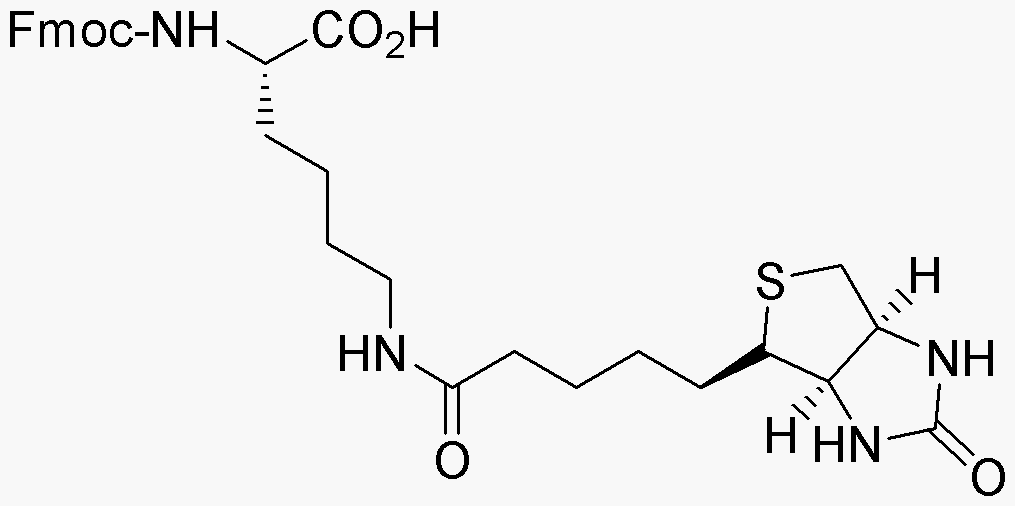Na-Fmoc-Ne-biotinyl-L-lysine is widely utilized in research focused on:
- Bioconjugation: This compound is essential for attaching biomolecules, such as proteins or nucleic acids, to surfaces or other molecules, enhancing the study of biological interactions.
- Peptide Synthesis: It serves as a building block in peptide synthesis, allowing researchers to create complex peptides with specific functionalities for drug development and therapeutic applications.
- Targeted Drug Delivery: By utilizing its biotinylation properties, it enables the targeted delivery of drugs to specific cells or tissues, improving treatment efficacy and reducing side effects.
- Diagnostics: The compound is used in the development of diagnostic tools, such as biosensors, where its ability to bind to specific targets can enhance the sensitivity and specificity of detection methods.
- Research in Cell Biology: It plays a crucial role in studying cellular processes by facilitating the labeling of proteins, allowing researchers to visualize and track cellular functions in real-time.
General Information
Properties
Safety and Regulations
Applications
Na-Fmoc-Ne-biotinyl-L-lysine is widely utilized in research focused on:
- Bioconjugation: This compound is essential for attaching biomolecules, such as proteins or nucleic acids, to surfaces or other molecules, enhancing the study of biological interactions.
- Peptide Synthesis: It serves as a building block in peptide synthesis, allowing researchers to create complex peptides with specific functionalities for drug development and therapeutic applications.
- Targeted Drug Delivery: By utilizing its biotinylation properties, it enables the targeted delivery of drugs to specific cells or tissues, improving treatment efficacy and reducing side effects.
- Diagnostics: The compound is used in the development of diagnostic tools, such as biosensors, where its ability to bind to specific targets can enhance the sensitivity and specificity of detection methods.
- Research in Cell Biology: It plays a crucial role in studying cellular processes by facilitating the labeling of proteins, allowing researchers to visualize and track cellular functions in real-time.
Documents
Safety Data Sheets (SDS)
The SDS provides comprehensive safety information on handling, storage, and disposal of the product.
Product Specification (PS)
The PS provides a comprehensive breakdown of the product’s properties, including chemical composition, physical state, purity, and storage requirements. It also details acceptable quality ranges and the product's intended applications.
Certificates of Analysis (COA)
Search for Certificates of Analysis (COA) by entering the products Lot Number. Lot and Batch Numbers can be found on a product’s label following the words ‘Lot’ or ‘Batch’.
Numéro de catalogue
Numéro de lot/série
Certificates Of Origin (COO)
This COO confirms the country where the product was manufactured, and also details the materials and components used in it and whether it is derived from natural, synthetic, or other specific sources. This certificate may be required for customs, trade, and regulatory compliance.
Numéro de catalogue
Numéro de lot/série
Safety Data Sheets (SDS)
The SDS provides comprehensive safety information on handling, storage, and disposal of the product.
DownloadProduct Specification (PS)
The PS provides a comprehensive breakdown of the product’s properties, including chemical composition, physical state, purity, and storage requirements. It also details acceptable quality ranges and the product's intended applications.
DownloadCertificates of Analysis (COA)
Search for Certificates of Analysis (COA) by entering the products Lot Number. Lot and Batch Numbers can be found on a product’s label following the words ‘Lot’ or ‘Batch’.
Numéro de catalogue
Numéro de lot/série
Certificates Of Origin (COO)
This COO confirms the country where the product was manufactured, and also details the materials and components used in it and whether it is derived from natural, synthetic, or other specific sources. This certificate may be required for customs, trade, and regulatory compliance.


